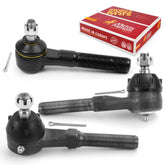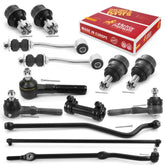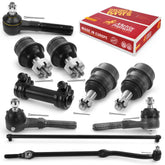Beyond the Logo: The Art and Science of Choosing Aftermarket Parts When Original Parts Fail
Keynotes:
- Steering and suspension parts on any vehicle will experience wear and tear due to various factors, including usage, environmental conditions, and age.
- Specially designed and engineered aftermarket parts offer premium solutions for worn parts on aged vehicles.
- OEMs may choose to sacrifice quality to meet cost or performance targets.
When it comes to keeping your vehicle in top shape, the suspension and steering systems are critical components that require regular maintenance and occasional repairs. OEM (Original Equipment Manufacturer) parts are typically known as default choice for replacement parts, but many times these parts can fail due to a variety of factors. In this blog, we'll explore why OEM parts may fail and why aftermarket alternatives can be a better option.
Why do OEM steering, and suspension parts fail?
There are several reasons why OEM parts may fail over time:
- Wear and Tear: Even the highest quality OEM parts can wear out over time due to regular use, exposure to the elements, and the stress of supporting the weight of the vehicle.
- Poor Manufacturing: While OEM parts are generally of high quality, there may be instances where the manufacturing process was not up to par, resulting in parts that are prone to failure.
- Cost-cutting measures: In some cases, OEMs may choose to use lower quality materials or manufacturing processes to reduce costs, which can compromise the durability and performance of the parts.
Why do OEM parts sometimes sacrifice quality?
OEMs must balance a number of factors when designing and manufacturing parts, including cost, durability, and performance. In some cases, OEMs may choose to sacrifice quality to meet cost or performance targets.
For example, an OEM may choose to use a lower grade of steel in a suspension part to reduce weight and improve fuel efficiency. However, this can compromise the durability of the part and lead to failure over time.
There are a few reasons why OEM (original equipment manufacturer) steering and suspension parts might sacrifice quality:
- Cost considerations: OEM manufacturers may try to keep costs down to produce vehicles at a lower price point, which can lead to the use of lower quality parts.
- Mass production: OEM manufacturers may need to produce large quantities of parts quickly and efficiently to meet the demand of auto makers, which can lead to shortcuts in manufacturing processes or use of less expensive materials to speed up production that can compromise quality.
- Design considerations: OEM manufacturers may prioritize certain design features or characteristics over overall quality, such as weight reduction or ease of assembly.
- Competition: In a highly competitive industry, OEM manufacturers may need to make trade-offs between quality and other factors, such as cost or performance, in order to remain at a competitive price point to win contracts from auto makers.
Why are aftermarket alternatives better?
Aftermarket alternatives can offer several advantages over OEM parts:
1. Improved Quality: Aftermarket manufacturers often use higher quality materials and manufacturing processes than OEMs, which can result in parts that are more durable and longer lasting.
2. Specialization: Aftermarket manufacturers often specialize in specific types of parts or vehicles, allowing them to focus on quality and performance rather than meeting the needs of a broad range of vehicles.
3. Customization: Aftermarket parts can often be customized to meet specific needs or preferences, such as lowering kits or high-performance suspension components. Meet GDX (Gold Drive Experience) by Metrix Premium Chassis Parts for custom gold Stabilizer Bar Links for a customized style and upgraded performance
4. Warranty: Some aftermarket manufacturers offer longer or more comprehensive warranties than OEM manufacturers, providing additional peace of mind for car owners.
5. Variety: Aftermarket manufacturers offer a wide range of options for steering and suspension components, including high-performance and specialized parts that may not be available from OEM manufacturers.
6. Cost: Aftermarket parts may offer a better value for the money, providing similar or better quality and performance than OEM parts at a lower cost.
However, it's important to note that not all aftermarket parts are created equal, and some may be of lower quality than OEM parts. It's essential to choose aftermarket parts from reputable manufacturers who have a track record of producing high-quality, reliable components. Additionally, some car manufacturers may void a vehicle's warranty if aftermarket parts are installed, so car owners should check their warranty.
In conclusion, while OEM parts are generally of high quality, there are instances where they may fail due to wear and tear, poor manufacturing, or cost-cutting measures. Aftermarket alternatives can offer improved quality, specialization, and customization options, making them a compelling choice for vehicle owners looking to upgrade their suspension or steering.
Explore our catalog for wide selection of Steering and Suspension parts!









